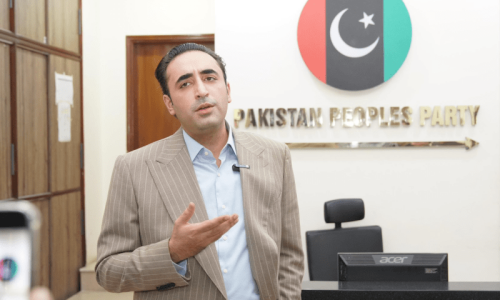TEHRAN, Sept 25: Iran said on Saturday it has successfully test-fired a strategic missile and delivered it to its armed forces, state-run radio reported.
"This strategic missile was successfully test-fired during (the recent) military exercises by the Revolutionary Guards and delivered to the armed forces," Defence Minister Ali Shamkhani was quoted by the radio as saying.
The announcement came days after Israel said it was buying from the United States about 5,000 smart bombs, including 500 one-ton bunker-busters that can destroy 6-foot-thick concrete walls.
The missile, unnamed for security reasons, was successfully tested last week, Shamkhani was quoted as saying by state television.
It was unclear if the weapon in question was the Shahab-3 medium-range missile, acquired by the Revolutionary Guards in July last year, of which an improved version was successfully tested in August.
The Shahab-3 is based on a North Korean design and is thought to be capable of carrying a one-ton warhead at least 1,300 kilometres, well within range of Israel.
Steady progress made by Iran's ballistic missile programme is a source of concern to many countries, adding to worries about the country's nuclear programme, which Tehran insists is peaceful.
DEADLINE: The UN nuclear watchdog passed a resolution on Saturday setting a Nov 25 deadline for Iran to clear up suspicions over its nuclear activities or risk having the issue referred to the Security Council for possible sanctions.
The International Atomic Energy Agency resolution also demanded that Iran halt all activities related to uranium enrichment, a part of the nuclear fuel cycle that can be used for both energy and weapons purposes.
Iran has repeatedly insisted that its nuclear programme is intended for domestic energy needs.
Iran says the Shahab-3 is simply a deterrent, while Israel charges that the Islamic state could have a nuclear warhead by 2007, leading to speculation that Israel may launch a preemptive strike against Iran's nuclear facilities.
In 1981, Israel bombed Iraq's nuclear reactor before the reactor could begin operating and the smart bombs are believed to be capable of destroying Iranian nuclear facilities.
The elite Revolutionary Guards staged military manoeuvres earlier this month near the border with Iraq, with top military officials saying the exercise was designed to reinforce Iran's resolve to defend itself against "big powers."
During the manoeuvres, state-run radio described the missile as a "long-range missile" that would be test-fired. Later, there was no official confirmation of the test.
In New York, French Foreign Minister Michel Barnier said on Friday that Iran's nuclear programme could be referred to the UN Security Council if the world is not reassured about its nuclear ambitions.
"We are waiting clearly from Iran gestures and decisions that will reassure us," Barnier said in a lunch with French media on the sidelines of the UN General Assembly.
"Since there is a trust problem, dates have been set," he said, referring to a Nov 25 deadline for Iran to clear up suspicions over its activities or risk having the issue referred to the UN Security Council for possible sanctions- something the United States has sought.
"It will be a moment of truth," Barnier said, referring to the deadline. "I do not know for certain, but I have the feeling that the gravity of this moment has been well understood (by Tehran)."
"If I am proven wrong, or if we do not obtain these gestures, we will see through what conditions to pass to next step, which is the Security Council," Barnier said. "But we are not there yet."
The IAEA resolution also demands that Iran halt all activities related to uranium enrichment, a part of the nuclear fuel cycle that can be used for both energy and weapons purposes.
Tehran has repeatedly insisted that its nuclear programme is intended for domestic energy needs.
Iran insisted on Friday it would do everything possible to reassure a jittery world about its nuclear programme.
"While we insist on our right to technology for peaceful purposes, we have and will leave no stone unturned in order to provide assurances of our peaceful intentions," Foreign Minister Kamal Kharazi said at the United Nations.-AP/AFP













































Dear visitor, the comments section is undergoing an overhaul and will return soon.